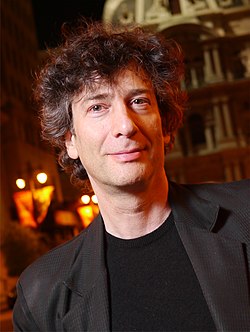Neil Gaiman Quote
I had forgotten what fiction was to me as a boy, forgotten what it was like in the library: fiction was an escape from the intolerable, a doorway into impossibly hospitable worlds where things had rules and could be understood; stories had been a way of learning about life without experiencing it, or perhaps of experiencing it as an eighteenth-century poisoner dealt with poisons, taking them in tiny doses, such that the poisoner could cope with ingesting things that would kill someone who was not inured to them. Sometimes fiction is a way of coping with the poison of the world in a way that lets us survive it.
Neil Gaiman
I had forgotten what fiction was to me as a boy, forgotten what it was like in the library: fiction was an escape from the intolerable, a doorway into impossibly hospitable worlds where things had rules and could be understood; stories had been a way of learning about life without experiencing it, or perhaps of experiencing it as an eighteenth-century poisoner dealt with poisons, taking them in tiny doses, such that the poisoner could cope with ingesting things that would kill someone who was not inured to them. Sometimes fiction is a way of coping with the poison of the world in a way that lets us survive it.
Related Quotes
It is as difficult for most poor people to truly believe that they could someday escape poverty as it is for most wealthy people to truly believe that their wealth could someday escape them.
Mokokoma Mokhonoana
Tags:
a breeze, a cinch, a piece of cake, a snap, arduous, arduousness, arrogance, arrogant, back breaking, bankrupt
About Neil Gaiman
Neil Richard MacKinnon Gaiman (; born Neil Richard Gaiman; 10 November 1960) is an English author of short fiction, novels, comic books, audio theatre, and screenplays. His works include the comic series The Sandman (1989–1996) and the novels Good Omens (1990), Stardust (1999), American Gods (2001), Coraline (2002), Anansi Boys (2005), The Graveyard Book (2008) and The Ocean at the End of the Lane (2013). He co-created the TV adaptations of Good Omens and The Sandman.
Gaiman's awards include Hugo, Nebula, and Bram Stoker awards and Newbery and Carnegie medals. He is the first author to win the Newbery and the Carnegie medals for the same work, The Graveyard Book. The Ocean at the End of the Lane was voted Book of the Year in the British National Book Awards, and it was adapted into an acclaimed stage play at the Royal National Theatre in London.
Beginning in 2024, news outlets published sexual assault accusations against Gaiman by numerous women. This affected or halted production on several adaptations of his work. One accuser sued Gaiman and his estranged wife Amanda Palmer for rape and human trafficking.
Gaiman's awards include Hugo, Nebula, and Bram Stoker awards and Newbery and Carnegie medals. He is the first author to win the Newbery and the Carnegie medals for the same work, The Graveyard Book. The Ocean at the End of the Lane was voted Book of the Year in the British National Book Awards, and it was adapted into an acclaimed stage play at the Royal National Theatre in London.
Beginning in 2024, news outlets published sexual assault accusations against Gaiman by numerous women. This affected or halted production on several adaptations of his work. One accuser sued Gaiman and his estranged wife Amanda Palmer for rape and human trafficking.
